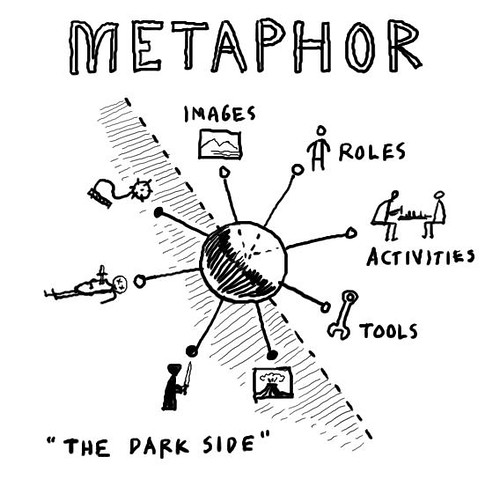In his book Smart Things, Mike Kuniavsky suggests metaphor as a tool for thinking through ubicomp designs and interactions. By mapping one category onto another we can discover new insights -- among other things, it's a way to trick the mind into seeing old things in new ways.
Organizational metaphors (ways of organizing services) include the factory, the public utility, parallel universes and so on.
Metaphors also help people understand new services by linking the new to the familiar. For example, RFID was first introduced as the next generation of the bar code, even though the two technologies had little in common.
Kuniavsky suggests that when exploring a new concept via metaphor, it pays to explore the dark side as well as optimistic scenarios to get a more well-rounded picture of the future system. How might your design be thwarted? How might the system be hijacked or co-opted for other uses?
Please share your thoughts!

Here's how I've mapped ways of reading via metaphor, showing productive and "dark side" modes of reader response: http://www.theillustratedprofessor.com/?page_id=1774
ReplyDeleteMetaphor is clearly useful for brainstorming (or gamestorming) and explaining, especially when dealing with new platforms and media. Of course, it's also horribly limiting, as evidenced by the MOO in this early Internet Public Library reference center:
ReplyDeletehttp://web.archive.org/web/19981205085008/ipl.org/ref/
And, I suspect that for ubiquitous ecologies, metaphor will prove even more limiting even faster because of all the strange connections.
Perhaps we need to play the game of "metaphor mashups". For instance, Redbox is a vending machine for movies. But if we stop with that first metaphor, we fail to imagine the possibilities. It also works like restaurant carryout. You can order and pay ahead, so you don't waste time searching at the kiosk (while impatient strangers look over your shoulder).
But even multiple metaphors won't do the trick. Whenever we use metaphors in design, we should immediately follow up by listing all the ways we can/will go beyond the metaphor.
And, of course, we should definitely explore the dark side. How could that not be fun? :-)
Fr sure, metaphors should be a tool and we shouldn't allow ourselves to be constrained by them unnecessarily. I like the idea of metaphor mashups.
ReplyDelete